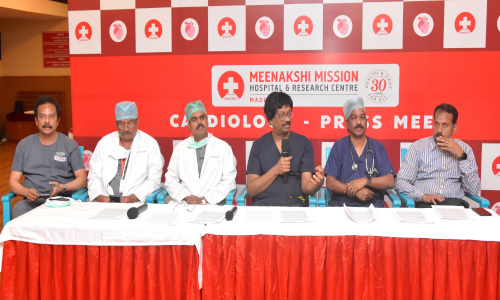Addressing a media conference organised here to mark the World Heart Day 2022, which falls on September 29 every year, the experts pointed out that cardiovascular diseases, a group of diseases that affect heart and blood vessels (veins and arteries), have been the biggest killers in recent decades. Every year 18 million people die of these diseases globally – and nearly 5 million of the deaths occur in India.
In his address Dr. N Ganesan, HOD of Cardiology, Meenakshi Mission Hospital and Research Centre said ” Acute and chronic stress is among the key but modifiable risk factors. “Constant and overexposure to stress due to competition and deadlines for young people has become a norm these days. Stress has the potential to change the inner linings of heart arteries, and cause inflammation. These changes can facilitate blood clot and result in heart attacks. In addition to stress, young people today sleep less – they are awake till midnight; they have no time for relaxation. They eat out at fast food joints too often. Besides, the smokers population is growing in India, which is home to 12% of the world`s smokers. Working in the services industry means less physical work. All these only increase the vulnerability of the youth to develop heart diseases.”
“Though stress is common and is unavoidable, we must know how the body absorbs stress and how we can respond to it. Take time away from stressful situations. Know how to relax. It could be by listening to music or gardening or taking up a hobby. Yoga can really help. Walking is the best exercise. Bodybuilding can strengthen muscles and running and jogging can increase one`s stamina but they do not necessarily enhance heart health. But a brisk walk for about 45 minutes a day, five times a week can decrease the risk of heart attacks by 20%,” emphasised Dr. Ganesan the need for stress management.
In his comments, Dr. R.M. Krishnan, Senior Consultant & HOD – Cardiothoracic Vascular Surgery said ,” Indians are genetically disposed to heart ailments, and hence are at more risk of getting heart attacks than people elsewhere. “Every Indian is a loaded gun to have a heart attack. An average Indian is three times more likely to have a heart attack than an European, six times more than a Chinese, and 20 times more than a Japanese. In addition to genetic dispositions, changing lifestyle, and pollution is worsening the situation. Air and noise pollution can also result in inflammation of arteries.”
“Going out to have a cup of tea or coffee and samosa appears to be the most favourite way for people to take a break. But addictive substances are not good for health. 75% of our snacks have harmful trans fats. Tea breaks can be replaced with exercise breaks. Moderate to intense exercises is important not only for adults, but also for children and teens. Overweight people must reduce the intake of calories from fats and sugar. We must keep ourselves hydrated throughout the day, and have a diet of unprocessed and fresh foods, fruits and vegetables, whole grains, foods that are low in saturated fats, sugar and salt,” added Dr. R.M. Krishnan,.
Talking about the importance of medical examinations, Dr. S. Kumar, Senior Consultant and Head, Department of Cardiac Anaesthesiology said, “About 25% of heart diseases do not show any symptoms. Even if there is a block of just about 30-40%, it can result in heart attack and cardiac arrest. Though discomfort in the chest while having a brisk walk or pain in the left arm could be signs of heart ailments, some do not experience any symptom even when the blockage is severe. “Hence checkups are important. Every one of us must know our numbers in terms of the level of our blood pressure, cholesterol, and sugar. Regular checkups are a must especially for people with family history, diabetes, smoking habit, and hypertension. When someone turns 20 he or she must go for a blood test.
Exercise tests are important at 25, annual checkup and blood cholesterol check ups, from 30 years onwards, and CT scan is recommended for people who are 35 and above. These lab tests, physical examinations, and examinations of medical and family history and individual risk factors can help us act in time.”
The other dignitaries from Meenakshi Mission Hospital and Research Centre present were Dr. B. Kannan, Medical Administrator, Dr. R Sivakumar, Sr. Consultant – Cardiology, Dr. S. Selvamani, Sr. Consultant – Cardiology, Dr. Jeyapandian, Sr. Consultant – Cardiology and Dr. M Sampath Kumar, Sr. Consultant – Cardiology.



